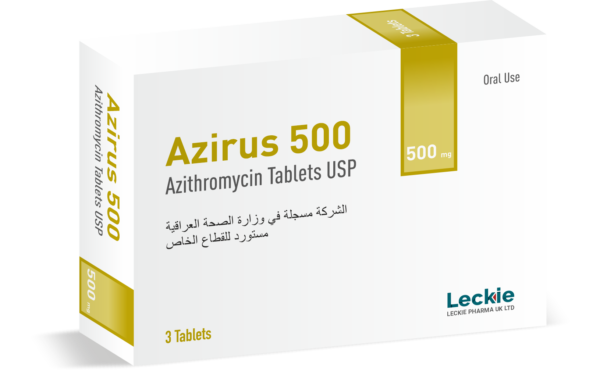Azirus



Azirus
Azithromycin tablets USP 500 mg
Read all of this leaflet carefully before you start taking this medicine because it contains important information for you.
– Keep this leaflet. You may need to read it again.
– If you have any further questions, ask your doctor or pharmacist.
– This medicine has been prescribed for you only. Do not pass it on to others. It may harm them, even if their signs of illness are the same as yours.
– If you get any side effects talk to your doctor or pharmacist. This includes any possible side effects not listed in this leaflet. See section 6.
What is in this leaflet
- What Azithromycin is and what it is used for
- What you need to know before you take Azithromycin
- How to take Azithromycin
- Possible side effects
- How to store Azithromycin
- Contents of the pack and other Information
- What Azithromycin is and what it is used for
Azithromycin belongs to a group of medicines called macrolide antibiotics. Antibiotics are used to treat infections caused by micro-organisms like bacteria. Azithromycin is used for the treatment of certain infections caused by bacteria that are sensitive to it, such as:
- chest, throat or nasal infections (such as bronchitis, pneumonia, tonsillitis, sore throat (pharyngitis) and sinusitis)
- ear infections
- skin and soft tissue infections
- infection of the tube that carries urine from the bladder (urethra) or the neck of the womb (cervix) caused by Chlamidia trachomatis (bacteria).
- What you need to know before you take Azithromycin
Do not take Azithromycin:
- if you are allergic to azithromycin dihydrate, erythromycin or any macrolide or ketolide antibiotic
Warnings and precautions
Talk with your doctor or pharmacist before taking Azithromycin if:
- you have severe liver or kidney problems
- you have severe heart problems or problems with your heart beat such as long QT syndrome (shown on an electro-cardiogram or ECG machine)
- your blood levels of potassium or magnesium are too low
- you develop signs of another infection
- you are taking any ergot derivatives such as ergotamine (to treat migraine) as these medicines should not be taken together with Azithromycin (see section “Taking other medicines”)
- you have a certain type of muscle weakness called myasthenia gravis
- you have nervous (neurological) or mental (psychiatric) problems.
Other medicines and Azithromycin
Tell your doctor or pharmacist if you are taking, have recently taken or might take any of the following medicines:
- antacids – used for heartburn and indigestion. Azithromycin should be taken at least 1 hour before or 2 hours after the antacid
- ergotamine – (used for migraine) should not be taken at the same time as serious side effects may develop (with numbness or tingling sensations in the limbs, muscle cramps, headaches, convulsions, abdominal or chest pain)
- cholesterol lowering medicines (statins)
- warfarin or similar medicines – used to thin the blood. Azithromycin can thin the blood even more
- cisapride – (used to treat stomach problems) should not be taken at the same time as this may cause severe heart problems (shown on an electro-cardiogram or ECG machine)
- terfenadine – (used to treat hay fever) should not be taken at the same time as this may cause severe heart problems (shown on an electrocardiogram or ECG machine)
- zidovudine or nelfinavir – used to treat HIV infections. Taking nelfinavir with Azithromycin may mean that you get more of the side effects listed in this leaflet
- rifabutin – used to treat tuberculosis (TB)
- quinidine – used to treat heart rhythm problems
- cyclosporin – used to stop your body rejecting an organ transplant. Your doctor will regularly check your blood levels of cyclosporin and may change your dose.
Tell your doctor or pharmacist if you are taking any of the following medicines. Azithromycin can make the effects of these other medicines stronger. Your doctor may change your dose:
- theophylline – used for breathing problems such as asthma and chronic obstructive pulmonary disease (COPD) • Increased or reduced urine output, or traces of blood in your urine
- Skin rash caused by sensitivity to sunlight
- Unusual bruising or bleeding
- Irregular heart beat.
These are all serious side effects. You may need urgent medical attention. Serious side effects are uncommon (may affect up to 1 in 100 people) or the frequency cannot be estimated from the available data. Other side effects include
Very common (may affect more than 1 in 10 people)
- diarrhoea
Common (may affect up to 1 in 10 people)
- headache
- being sick (vomiting), stomach pain or cramps, loss of appetite
- change in the quantity of the white blood cells and the concentration of bicarbonate in the blood.
Uncommon (may affect up to 1 in 100 people)
- thrush (candidiasis) – a fungal infection
- fungal infection
- bacterial infection
- inflammation of the throat (pharyngitis)
- breathlessness, chest pain, wheeze and cough (respiratory disorder)
- inflammation of the mucous membrane inside the nose (rhinitis)
- stomach flu (gastroenteritis)
- inflammation inside your vagina (vaginitis)
- pneumonia
- changes in the number of white blood cells
- angioedema
- hypersensitivity
- lack of appetite (anorexia)
- nervousness
- feeling drowsy (somnolence)
- changes in your sense of taste
- sensation of pins and needles or numbness (paraesthesia)
- visual impairment
- having difficulty sleeping (insomnia)
- ear disorder
- dizziness
- spinning sensation (vertigo)
- palpitations
- hot flushes
- shortness of breath
- nosebleed
- inflammation of the lining of the stomach (gastritis)
- constipation
- loose wind (flatulence)
- difficulty swallowing
- swollen abdomen
- dry mouth
- belching
- mouth ulcer
- increased salivary flow
- skin rash
- itching
- inflammation of the skin (dermatitis)
- dry skin
- increased sweating
- pain, swelling and reduced motion in your joints (osteoarthritis)
- muscle pain
- back pain
- neck pain
- increase in blood urea levels
- painful or difficult urination
- pain in the upper back (renal pain)
- spotting
- testicular disorder
- urticaria
- chest pain
- face swelling
- fever
- pain
- swelling of extremities (peripheral edema)
- swelling (oedema)
- general feeling of being unwell (malaise)
- fatigue
- weakness (asthenia)
- change in liver enzyme levels and blood levels
- post procedural complications
Rare (may affect up to 1 in 1,000 people)
- feeling agitated
- abnormal hepatic function, yellowing of the skin and whites of the eyes, dark urine, pale stool
- allergic skin reactions such as being sensitive to sunlight
- skin eruption that is characterized by the rapid appearance of areas of red skin studded with small pustules (small blisters filled with white/yellow fluid).
Not known (frequency cannot be estimated from the available data)
- gut (colon) infection (pseudomembranous colitis)
- reduced number of red blood cells due to destruction (haemolytic anaemia); reduction in number of platelets (thrombocytopenia)
- anaphylactic reaction
- feeling angry, aggressive
- anxiety
- confusion
- hallucination
- fainting (syncope)
- fits (convulsions)
- reduced sense of touch (hypoaesthesia)
- feeling hyperactive
- change in your sense of smell (anosmia, parosmia)
- change in your sense of taste (ageusia)
- exacerbation or aggravation of muscle weakness (myasthenia gravis)
- impaired hearing including loss of hearing, ringing in your ears
- rapid (ventricular tachycardia) or irregular heart beat, sometimes being life-threatening, changes of the heart rhythm found by an electrocardiogram (QT prolongation and torsade de pointes)
- low blood pressure
- inflammation of the pancreas (pancreatitis)
- digoxin – used to treat heart problems
- pimozide – used to treat mental health problems.
Azithromycin with food and drink
This medicine can be taken with or without food.
Pregnancy, breast-feeding and fertility
If you are pregnant or breast-feeding, think you may be pregnant or are planning to have a baby, ask your doctor or pharmacist for advice before taking this medicine.
There is insufficient information available about the use of Azithromycin during pregnancy. Therefore you should not use Azithromycin during pregnancy, unless explicitly advised by your doctor.
Azithromycin is partially passed through the mother’s milk, therefore Azithromycin should not be used if you are breastfeeding.
Driving and using machines
There are no data available about the influence of Azithromycin on the ability to drive or operate machines. However Azithromycin may cause dizziness and seizures so make sure you are not affected before driving or operating machinery.
Azithromycin contains lactose monohydrate.
If you have been told by your doctor that you have an intolerance to some sugars, contact your doctor before taking medicinal product.
- How to take Azithromycin
Always take this medicine exactly as your doctor or pharmacist has told you. Check with your doctor or pharmacist if you are not sure.
The recommended dose:
For adults and young people with a body weight of 45 kg or over
500 mg once daily for three days with a total dose of 1500 mg. Alternatively your doctor may decide to prescribe the total dose of 1500 mg over a period of 5 days, with 500 mg the first day and 250 mg on days 2 to 5.
For infections of the neck of the womb and urethra caused by Chlamydia trachomatis
One dose of 1000 mg, to be taken one time.
Children and adolescents under 45 kg
The tablets are not recommended. Young people with a body weight of less than 45 kg should use other forms of this medicine.
Patients with kidney or liver problems
You should tell your doctor if you have kidney or liver problems as your doctor may need to alter the normal dose.
Dosage for elderly
For elderly the same dosage as for adults applies. The tablet can be divided into equal doses.
Method of administration
The tablets should be taken with ½ glass of water. The tablets can be taken with or without food.
If you take more Azithromycin than you should
If you have taken too much Azithromycin, contact your doctor, pharmacist or go to your nearest hospital at once.
Symptoms of overdose are loss of hearing, feeling sick or being sick and diarrhoea. In case of overdosage admission into hospital may be necessary.
If you forget to take Azithromycin
If you forget to take Azithromycin, take your dose as soon as possible. If it is almost time for the next dose, just skip that dose and take the next one when it is due. If in doubt, please contact your doctor or pharmacist. If you have to skip a dose, still take all of your tablets. This means that you will finish your course a day later.
Do not take a double dose to make up for a forgotten dose.
If you stop taking Azithromycin
Never stop the treatment with Azithromycin on your own, but first discuss this with your doctor. If the prescribed treatment is not completely finished, the infection may come back again.
If you have any further questions on the use of this medicine, ask your doctor or pharmacist.
- How to store Azithromycin
Store below 30°C, Protect from light and moisture. Keep the medicine out of reach of children.
Do not use this medicine after the expiry date which is stated on the carton after EXP. The expiry date refers to the last day of that month.
Do not throw away any medicines via wastewater or household waste. Ask your pharmacist how to throw away medicines you no longer use. These measures will help protect the environment.
- Contents of the pack and other information
What Azithromycin contains
– The active substance is azithromycin dihydrat USP
Each Film-Coated Contains 500 mg of Azithromycin USP.
Presentation :
3 tablets in a pack